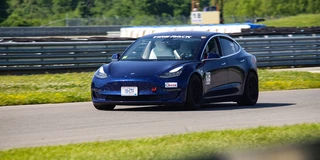
SCCA’s Electrified Vehicle Advisory Committee (EVAC) has released proposed guidelines and rulesets for EVs and three EV racing classes. These documents are available for review right now, and the EVAC is seeking feedback.
SCCA Area 4 Director Dayle Frame, who leads the currently 12-person EVAC team, said the three documents contain general guidelines for EV usage at all SCCA events, as well as rulesets for development of an “E” Touring category of road racing cars and a Prototype category electrified vehicle class within SCCA Road Racing.
“None of these proposed rulesets have actually been OK’d yet by the Club Racing Board or SCCA Board of Directors,” Frame noted. “But we’re making these rule suggestions available now because we want input to properly assess where the SCCA membership wants to go as far as EVs are concerned.”
The EVAC’s proposed guidelines can be reviewed in full by clicking the link buttons below. Member feedback can be submitted via the online form found at crbscca.com, selecting the “Electric Vehicle” category after clicking “Club Racing Board” as the letter type.
SCREV Electric Touring Prototype Electric
A Closer Look
Be it Solo, Time Trials, SCCA Road Racing, RallyCross, HillClimb, or RoadRally, the 23-page Supplemental Common Rules for Electrified Vehicles (SCREV) looks to provide sage guidance for not only drivers and teams, but also event organizers and volunteers. The SCREV outlines a common safety and training baseline for all EVs across the various SCCA programs. It acts as an additional set of rules laying out the required elements that ensure the safety of all drivers, volunteers, and track workers when electrified vehicles are involved at events.
Within the SCREV text, it is noted that interpreting these supplemental competition rules for EVs shall be logical, as the document cannot cover all possible situations. As EV technology and safety guidance evolve, the SCREV will also evolve to support SCCA and its members.
When it comes to the new “E” Touring category of road race cars, the purpose and philosophy behind this development is to allow SCCA members the opportunity to compete in battery electric vehicles (BEVs) with limited modification that are suitable for Club sprint races. Modification to vehicles competing in the “E” category, including safety-related modifications, are limited only to those specifically allowed within the proposed ruleset.
Only cars available to the general public for purchase, and listed on manufacturer spec lines, will be eligible to compete within the category. Such vehicles must be approved by the Environmental Protection Agency and Department of Transportation for sale in the United States, or by Environment Canada for sale in Canada. However, it is important to note that car prep to meet category competition will result in the vehicle becoming a dedicated electric race vehicle, making it non-street legal.
The other document available for review deals with the new EV Prototype class. This ruleset encompasses converted, existing race cars, and new purpose-designed vehicles built using electric vehicle power technology that fit within the proposed rules.
Some technologies have been prohibited in the Prototype-based EV class due to cost, safety, availability, and complexity. As the individual status of prohibited technologies changes, they may be approved to aid in keeping the class current and attractive. These rules are not intended to freeze the class in time, but rather to encourage orderly and progressive change to keep the class current.
A rules package for EV formula cars is currently in the works.
Leading the Way
While internal combustion engines are not leaving SCCA competition anytime soon, EVs are very much the next major evolution in automobiles. In fact, several major auto manufacturers have committed to ending production of combustion engine vehicles within the next 15 years. Mike Cobb, SCCA President and CEO, certainly understands the passion nearly all SCCA members have for the combustion engine, but also knows the importance of looking to the future.
“For more than 75 years, Sports Car Club of America has spearheaded evolution in motorsports,” Cobb said. “SCCA has been the leader when it comes to engineering developments, safety improvements, and establishing standards that fuel a safe, fun, and exciting motorsports experience.
“Our Club is uniquely positioned to again define the future of racing across the United States, and perhaps the world, thanks to the unequalled expertise of our membership,” Cobb added. “By embracing developing technology around EVs, SCCA will again be a leader in motorsports for another 75 years and beyond.”
Frame noted that the EVAC – comprised of representatives from SCCA Road Racing, Track/Time Trials, Rally/Solo, and EV industry experts – has only begun its work. EVs have already won major events in SCCA Solo and Time Trials, meaning the motorsport landscape is already changing with great speed. So, the EVAC must remain focused on its task and be aware of the rapid pace of development.
“To say the future is ‘now’ would be an understatement,” Frame noted. "The work we, as a Club, put into EV matters today will help ensure a quality experience for SCCA members and motorsport enthusiasts for many years to come.
“There will be growing pains, and some decisions will need to be made quickly at times. That is just fact due to the lightning speed at which this technology is evolving,” Frame continued. “We ask SCCA members to be patient, understanding, and supportive as we all learn how best to utilize EVs for our sport and passion. But the EVAC will remain diligent to its task, and we promise to keep members aware of the path we’re headed.”
This is an important time in motorsports and SCCA’s history.
Please take time to review the three documents prepared by the EVAC, and don’t be shy to submit feedback at crbscca.com.
Photo by Philip Royle / Staff














